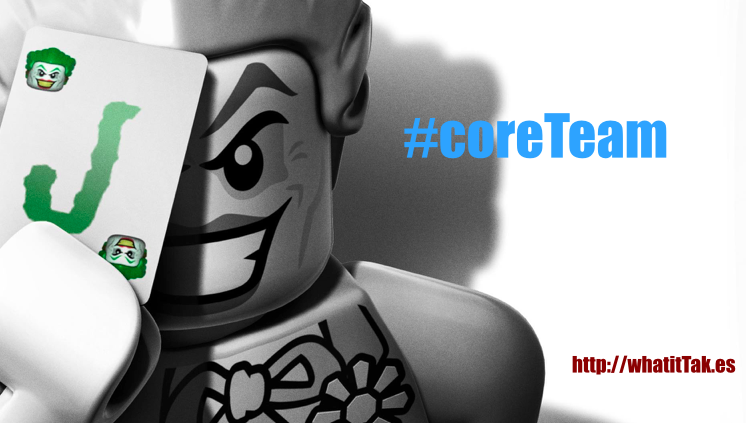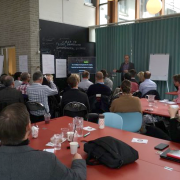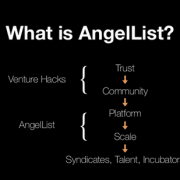5 skills founders better verify before deciding to add a core team member
Today’s guest post is from Tommaso Di Bartolo.
Startup is an amazing crazy ride. Unlike corporate business, every moment in startup makes you remember you live because of the thrilling paths and the amount of emotions you experience. The most compelling phase in a startup is the period of time before the product finds its product-market-fit. The time where you think you know what problem you are solving – but the market is not reacting the way you thought and the value you offer still hasn’t been proven out. This occurs usually in the third phase – out of four – of a startup life cycle. It’s the phase where the vision is being squeezed, where getting funded is hard if there isn’t enough traction, where releasing a sexy product is challenging if the right people aren’t on board, and the time where adding the “right core team members” is tough. But what does “the right” people mean in this case? What are the key attributes, skills or even qualifications the handful of key people you’ll call core team members will have?
Once upon a time, there were 3 friends that met at Stanford: a computer science engineer, a design guy and a business grad. During lunch time on a spring afternoon they, all together, came up with an idea, the prototype of which they released short after. They easily got traction and therefore funding from TOP Tier investors on Sand Hill Road. With the money they hired a stunning team, invested in developing a great working product which scaled globally and were acquired only 36 months later for a $1B …
… and then we all woke up … good morning!!!
The startup ride is a very turbulent one and “luckily” not for everybody – otherwise we would have even more competition ;-). Often we read about “overnight” successes – but it only was overnight for those who were not part of the journey… as stories like the one above don’t exist! Nor are most of the startups representing an “A-Team” that have already done it before. More often, early stage startup teams are a bunch of inexperienced hustlers, hackers and hipsters driven by the sentence to “change the world”, and more than 50% of them split up within the first 12 months… that’s where the shit hits the fan. Now, only teams who’ll write the most painful stories actually really make an impact. But what is it they do differently?
Startup Mindset goes over Education
While upcoming entrepreneurs have guidelines on how to build a lean startup or how to build a demand engine for products – there’s a lack of blueprints for how / what to consider to put the right people together, and therefore we underestimate the importance of how much business relies on relationships and their communication. And that behind every “tongue”… there is a mindset that is responsible for letting us do things the way we do… or simply don’t do. Mindset is often the make or break deal, especially in the early days. In other words, the people’s strength of mindset is what at the end makes a startup succeed or die. It’s what makes startup teams keep fighting and finding ways, or give up.
After 15 years of entrepreneurial experiences on three continents and four startups, I’ve learned the hard way that core team members’ soft skills were more important than their educational background. While I’m not saying that education doesn’t matter, make sure specific characteristics within core team players exist, especially during the initial delicate phase where things are not settled.
The biggest “bug” in an early stage startup is a “mismatched mindset” – Tommaso db
Watch out for genes – not qualifications
There’s a difference between the way you recruit a CFO for when you are scaling business and between “handpicking” a Senior Backend Engineer for an early stage startup. For the CFO you mainly consider qualifications, experiences and assure yourself with reference checks. For the Senior Backend Engineer the story is quite different. In an early stage startup it might be the case that you do have an MVP – but still not enough traction to prove assumptions and enchant with business success. Or – like in many early stage startups – you don’t have deep pockets and sweat equity is the compensation model to go to.
Even though on one hand your funds might be low and the pressure to move ahead with product development is high, you better make sure the person you decide to add as a core team member qualifies mindset-wise – before you match educational skills. This helps you avoid investing time and creating expectations with a candidate that sooner or later might leave if their mindset simply doesn’t fit. Don’t let circumstances hurry you on everything you are doing or pressure your decisions.
Don’t delude yourself because of an educational background or due to lack of options – but seek for genes that are crazy enough to go through the real side of your daily business.
…continue reading “5 skills founders better verify before deciding to add a core team member” on Tommaso’s blog WhatItTakes
 Tommaso Di Bartolo | @todiba
Tommaso Di Bartolo | @todiba
Expert in Residence, BootstrapLabs and CEO at swaaag.
Tommaso is a serial-entrepreneur with 2 exits, an advisor & an angel investor. He lives with his family in Silicon Valley.







